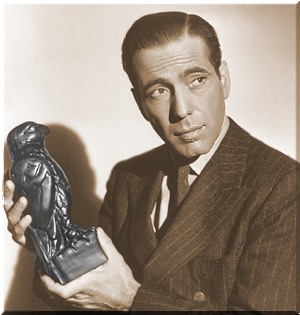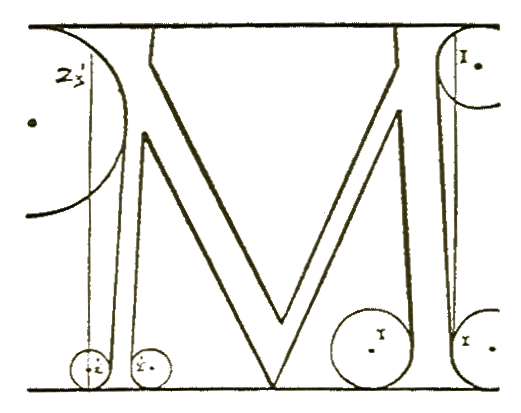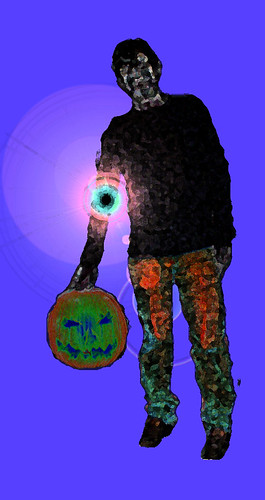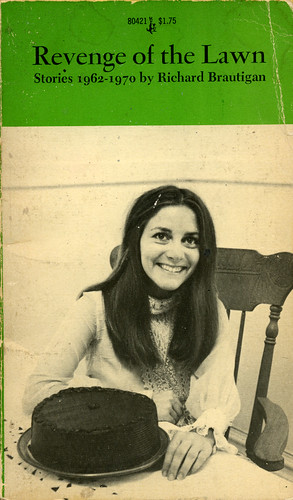
I finished
"Surely You're Joking, Mr. Feynman!" yesterday, much to my own delight. (I discovered that
the complete text is available online, and the public library has a wonderful, 10-disc audio version as well.) The book is edited from a series of interviews and conversations conducted with Feynman, and explore the more unusual aspects of his life. (Playing in a Samba band in Brazil, his short-lived career in art, his experiences learning to pick locks, etc.) The majority of the book tries to mine "funny" out of the life of a noble prize winning physicist who helped build the bomb used on Japan.
Feynman's dedication to solving puzzles, playing games, and generally being the smartest guy in the room is pretty incredible. I'm particularly impressed with his attitude toward the bullshit we deal with on a daily basis: royalty, celebrity, wealth, etc., are to be mocked, derided, and insulted, but being clever, earnestness, and intellect should admired. His public defense of a local strip bar (where, he claims, he would work on some of his theories on the paper plates) sits next to his mocking the US governments handling of patents as a testament to where his values lie. Not only practical and intelligent, he seems like exactly the kind of guy that sees the world for what it is, and not for how it is often presented.
One thing that did bother me about the book, though, is that his attitudes and intellect do conspire to create a certain kind of smugness and pretension that, ironically, works against his one feelings and attitudes about smugness and pretension. This is something I've struggled with in my own life; usually, the people who are against the bullshit in this world often take things so far in their own presentation that they become purveyors of their own pretension and bullshit. (Case in point: most subcultures.) Yes, I love it when the Country Mouse gets the better of the City Mouse, and I am naturally attracted to those kinds of stories anyway. But when the Country Mouse is singing his own praises as being better than the City Mouse, I start to get a little frustrated.
I also find his extreme preoccupation with sex to be a little ho-hum. This is obviously cultural, in our case; Americans are so completely uptight about sex, and at the time this book came out
Revenge of the Nerds hadn't yet changed the cultural perception of what the geeky guy in glasses was thinking about. So I can see why Feynman wanted to drop these stories about his adventures in bars, with girls, even if his advice is somewhat contemptible (if you treat girls really badly, they will sleep with you every single time). In the end, the So What factor starts to take over. Yes, you like pretty girls. Who doesn't? Yes, it's unexpected that a Professor would be chasing skirts and getting into fights in bars. Can we get back to the lock-picking stories? Everything relating to being interested was sort of boring, and instead of being revealing and shocking, it read more like, "Yeah, who isn't like that? Next." Humans, Feynman included, love to think that they are skirting the edges of acceptability when they are in polite society, not realizing that most other people feel this same way about themselves, too.
One persistent element of this book that I loved, though, is the reflections on alienation. Again, there is nothing new or unheard of in this, but his befuddlement and confusion about the human race struck a chord that rang very true for me, too. Specifically, his realization that the majority of people learn through memorization, rather than understanding. I've come up against that hundreds of times in my life. I feel like an absolute moron when I can't understand something, even if I could give you the right answer because I memorized it. Not understanding something is a terrible state to be in, and I am constantly living in terror of the things I can't parse or rationalize. A large portion of the world around me seems content with not knowing, and I feel as if this simple schism marks the divide between myself and the rest of the world.
But more general than that, Feynman outlines his struggles to incorporate himself into a world that doesn't make sense to him. He is baffled by arbitrary custom or inane social practice, and yet wants so badly to find a way to navigate them successfully, as if he's trying to solve the puzzle that is humanity. Our entire culture is based on establishing rules and scenarios that alienate some while including only select others. Feynman is horrified by this, and yet so desperately wants to be a part of the world that he can't entirely reject it. He jokes, kids, and does everything he can to avoid playing by the rules, but at the end of the day he can't entirely remove himself from society just because it is confusing.
That, more than anything, seems to be what he was driving at in this collection of strange anecdotes and bizarre reflections. Yes, this world is stupid, horrible, full of mean spirited people, and on the whole not the place you would choose to live if you could make that choice. But at the end of the day, we all have to live in the world. You might as well make a game of it to help pass the time.
Good advice? That's not my place to say. But there were times I laughed out loud, and others where I cried. What more could you ask for in a book by someone who made the bombing of Japan possible?





























 Devo - Something For Everybody
Devo - Something For Everybody






